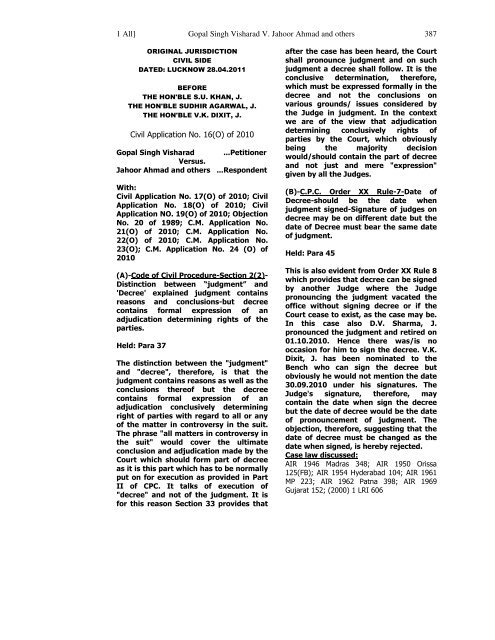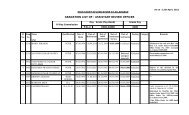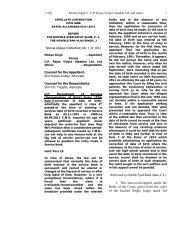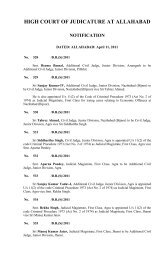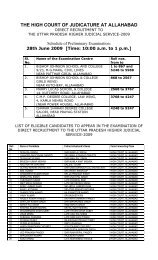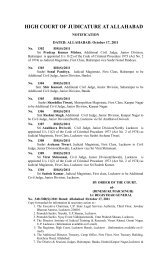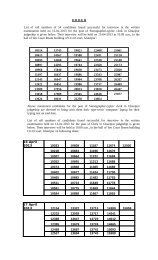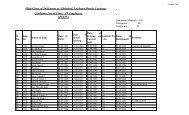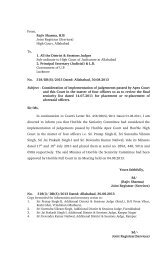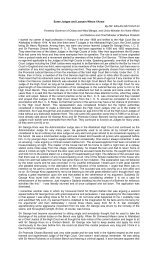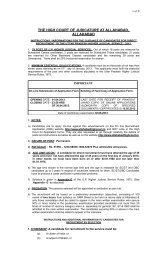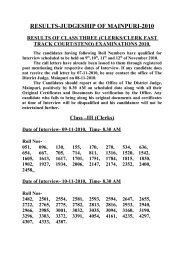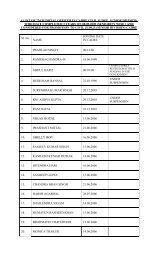Apr - High Court of Judicature at Allahabad
Apr - High Court of Judicature at Allahabad
Apr - High Court of Judicature at Allahabad
Create successful ePaper yourself
Turn your PDF publications into a flip-book with our unique Google optimized e-Paper software.
1 All] Gopal Singh Visharad V. Jahoor Ahmad and others 387<br />
ORIGINAL JURISDICTION<br />
CIVIL SIDE<br />
DATED: LUCKNOW 28.04.2011<br />
BEFORE<br />
THE HON'BLE S.U. KHAN, J.<br />
THE HON'BLE SUDHIR AGARWAL, J.<br />
THE HON'BLE V.K. DIXIT, J.<br />
Civil Applic<strong>at</strong>ion No. 16(O) <strong>of</strong> 2010<br />
Gopal Singh Visharad ...Petitioner<br />
Versus.<br />
Jahoor Ahmad and others ...Respondent<br />
With:<br />
Civil Applic<strong>at</strong>ion No. 17(O) <strong>of</strong> 2010; Civil<br />
Applic<strong>at</strong>ion No. 18(O) <strong>of</strong> 2010; Civil<br />
Applic<strong>at</strong>ion NO. 19(O) <strong>of</strong> 2010; Objection<br />
No. 20 <strong>of</strong> 1989; C.M. Applic<strong>at</strong>ion No.<br />
21(O) <strong>of</strong> 2010; C.M. Applic<strong>at</strong>ion No.<br />
22(O) <strong>of</strong> 2010; C.M. Applic<strong>at</strong>ion No.<br />
23(O); C.M. Applic<strong>at</strong>ion No. 24 (O) <strong>of</strong><br />
2010<br />
(A)-Code <strong>of</strong> Civil Procedure-Section 2(2)-<br />
Distinction between “judgment” and<br />
'Decree' explained judgment contains<br />
reasons and conclusions-but decree<br />
contains formal expression <strong>of</strong> an<br />
adjudic<strong>at</strong>ion determining rights <strong>of</strong> the<br />
parties.<br />
Held: Para 37<br />
The distinction between the "judgment"<br />
and "decree", therefore, is th<strong>at</strong> the<br />
judgment contains reasons as well as the<br />
conclusions there<strong>of</strong> but the decree<br />
contains formal expression <strong>of</strong> an<br />
adjudic<strong>at</strong>ion conclusively determining<br />
right <strong>of</strong> parties with regard to all or any<br />
<strong>of</strong> the m<strong>at</strong>ter in controversy in the suit.<br />
The phrase "all m<strong>at</strong>ters in controversy in<br />
the suit" would cover the ultim<strong>at</strong>e<br />
conclusion and adjudic<strong>at</strong>ion made by the<br />
<strong>Court</strong> which should form part <strong>of</strong> decree<br />
as it is this part which has to be normally<br />
put on for execution as provided in Part<br />
II <strong>of</strong> CPC. It talks <strong>of</strong> execution <strong>of</strong><br />
"decree" and not <strong>of</strong> the judgment. It is<br />
for this reason Section 33 provides th<strong>at</strong><br />
after the case has been heard, the <strong>Court</strong><br />
shall pronounce judgment and on such<br />
judgment a decree shall follow. It is the<br />
conclusive determin<strong>at</strong>ion, therefore,<br />
which must be expressed formally in the<br />
decree and not the conclusions on<br />
various grounds/ issues considered by<br />
the Judge in judgment. In the context<br />
we are <strong>of</strong> the view th<strong>at</strong> adjudic<strong>at</strong>ion<br />
determining conclusively rights <strong>of</strong><br />
parties by the <strong>Court</strong>, which obviously<br />
being the majority decision<br />
would/should contain the part <strong>of</strong> decree<br />
and not just and mere "expression"<br />
given by all the Judges.<br />
(B)-C.P.C. Order XX Rule-7-D<strong>at</strong>e <strong>of</strong><br />
Decree-should be the d<strong>at</strong>e when<br />
judgment signed-Sign<strong>at</strong>ure <strong>of</strong> judges on<br />
decree may be on different d<strong>at</strong>e but the<br />
d<strong>at</strong>e <strong>of</strong> Decree must bear the same d<strong>at</strong>e<br />
<strong>of</strong> judgment.<br />
Held: Para 45<br />
This is also evident from Order XX Rule 8<br />
which provides th<strong>at</strong> decree can be signed<br />
by another Judge where the Judge<br />
pronouncing the judgment vac<strong>at</strong>ed the<br />
<strong>of</strong>fice without signing decree or if the<br />
<strong>Court</strong> cease to exist, as the case may be.<br />
In this case also D.V. Sharma, J.<br />
pronounced the judgment and retired on<br />
01.10.2010. Hence there was/is no<br />
occasion for him to sign the decree. V.K.<br />
Dixit, J. has been nomin<strong>at</strong>ed to the<br />
Bench who can sign the decree but<br />
obviously he would not mention the d<strong>at</strong>e<br />
30.09.2010 under his sign<strong>at</strong>ures. The<br />
Judge's sign<strong>at</strong>ure, therefore, may<br />
contain the d<strong>at</strong>e when sign the decree<br />
but the d<strong>at</strong>e <strong>of</strong> decree would be the d<strong>at</strong>e<br />
<strong>of</strong> pronouncement <strong>of</strong> judgment. The<br />
objection, therefore, suggesting th<strong>at</strong> the<br />
d<strong>at</strong>e <strong>of</strong> decree must be changed as the<br />
d<strong>at</strong>e when signed, is hereby rejected.<br />
Case law discussed:<br />
AIR 1946 Madras 348; AIR 1950 Orissa<br />
125(FB); AIR 1954 Hyderabad 104; AIR 1961<br />
MP 223; AIR 1962 P<strong>at</strong>na 398; AIR 1969<br />
Gujar<strong>at</strong> 152; (2000) 1 LRI 606


